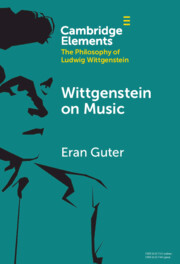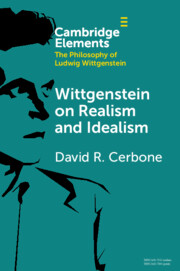124 results
Ailments of the Soul
-
- Journal:
- New Blackfriars ,
- Published online by Cambridge University Press:
- 22 March 2024, pp. 1-17
-
- Article
-
- You have access
- HTML
- Export citation

Wittgenstein on Music
-
- Published online:
- 04 March 2024
- Print publication:
- 11 April 2024
-
- Element
- Export citation
Human Beings and Ethics in the Thought of Herbert McCabe
-
- Journal:
- New Blackfriars / Volume 105 / Issue 3 / May 2024
- Published online by Cambridge University Press:
- 21 February 2024, pp. 294-308
- Print publication:
- May 2024
-
- Article
-
- You have access
- Open access
- HTML
- Export citation
4 - Wittgensteinean Notions of Uniformity and Kripkensteinean Skepticism
-
-
- Book:
- Kripke's <i>Wittgenstein on Rules and Private Language</i> at 40
- Published online:
- 22 February 2024
- Print publication:
- 08 February 2024, pp 69-86
-
- Chapter
- Export citation
5 - Wittgenstein’s Naturalism and the Skeptical Paradox
-
-
- Book:
- Kripke's <i>Wittgenstein on Rules and Private Language</i> at 40
- Published online:
- 22 February 2024
- Print publication:
- 08 February 2024, pp 87-106
-
- Chapter
- Export citation
1 - Kripke’s Wittgenstein’s Skepticism about Rules and Meaning
-
-
- Book:
- Kripke's <i>Wittgenstein on Rules and Private Language</i> at 40
- Published online:
- 22 February 2024
- Print publication:
- 08 February 2024, pp 14-34
-
- Chapter
- Export citation
13 - The Meaning of Meaning Ascriptions
-
-
- Book:
- Kripke's <i>Wittgenstein on Rules and Private Language</i> at 40
- Published online:
- 22 February 2024
- Print publication:
- 08 February 2024, pp 238-258
-
- Chapter
- Export citation
3 - Answering Kripke’s Skeptic
-
-
- Book:
- Kripke's <i>Wittgenstein on Rules and Private Language</i> at 40
- Published online:
- 22 February 2024
- Print publication:
- 08 February 2024, pp 55-68
-
- Chapter
- Export citation
2 - Putting Wittgenstein Back into Kripkenstein:
-
-
- Book:
- Kripke's <i>Wittgenstein on Rules and Private Language</i> at 40
- Published online:
- 22 February 2024
- Print publication:
- 08 February 2024, pp 35-54
-
- Chapter
- Export citation
12 - “Considered in Isolation”
-
-
- Book:
- Kripke's <i>Wittgenstein on Rules and Private Language</i> at 40
- Published online:
- 22 February 2024
- Print publication:
- 08 February 2024, pp 220-237
-
- Chapter
- Export citation
6 - Kripke and Wittgenstein on Rules and Meaning
-
-
- Book:
- Kripke's <i>Wittgenstein on Rules and Private Language</i> at 40
- Published online:
- 22 February 2024
- Print publication:
- 08 February 2024, pp 107-123
-
- Chapter
- Export citation
11 - Communitarianism, Interpersonalism, and Individualism in Kripke’s “Skeptical Solution”
-
-
- Book:
- Kripke's <i>Wittgenstein on Rules and Private Language</i> at 40
- Published online:
- 22 February 2024
- Print publication:
- 08 February 2024, pp 201-219
-
- Chapter
- Export citation
8 - What Is the Skeptical Problem? Wittgenstein’s Response to Kripke
-
-
- Book:
- Kripke's <i>Wittgenstein on Rules and Private Language</i> at 40
- Published online:
- 22 February 2024
- Print publication:
- 08 February 2024, pp 142-162
-
- Chapter
- Export citation
14 - Kuhn and the History of Science
- from Part IV - Kuhn’s Impact on the Philosophy, Sociology, and History of Science
-
-
- Book:
- Kuhn's <i>The Structure of Scientific Revolutions</i> at 60
- Published online:
- 05 January 2024
- Print publication:
- 18 January 2024, pp 254-274
-
- Chapter
- Export citation
Is it Ever Right to Lie? How Ethical Questions Bring us to Philosophy of Mind
-
- Article
-
- You have access
- Open access
- HTML
- Export citation

Wittgenstein on Realism and Idealism
-
- Published online:
- 04 December 2023
- Print publication:
- 01 February 2024
-
- Element
- Export citation
6 - Skepticism, Fideism, and Religious Epistemology
- from Part I - Faith and Rationality
-
-
- Book:
- The Cambridge Handbook of Religious Epistemology
- Published online:
- 24 August 2023
- Print publication:
- 17 August 2023, pp 83-95
-
- Chapter
- Export citation
20 - Rules
- from Part III - Media and Modes of Ethical Practice
-
-
- Book:
- The Cambridge Handbook for the Anthropology of Ethics
- Published online:
- 11 May 2023
- Print publication:
- 25 May 2023, pp 508-535
-
- Chapter
- Export citation
23 - The 1813 Campaign in Central Europe
- from Part IV - Napoleon’s Military Campaigns in Europe
-
-
- Book:
- The Cambridge History of the Napoleonic Wars
- Published online:
- 20 December 2022
- Print publication:
- 02 March 2023, pp 471-491
-
- Chapter
- Export citation
Wittgensteinian blasphemy: what it's like to be a heretic
-
- Journal:
- Religious Studies / Volume 60 / Issue 1 / March 2024
- Published online by Cambridge University Press:
- 17 February 2023, pp. 89-102
- Print publication:
- March 2024
-
- Article
-
- You have access
- HTML
- Export citation

